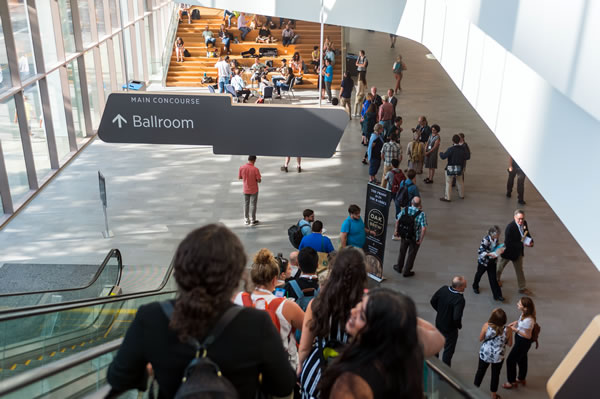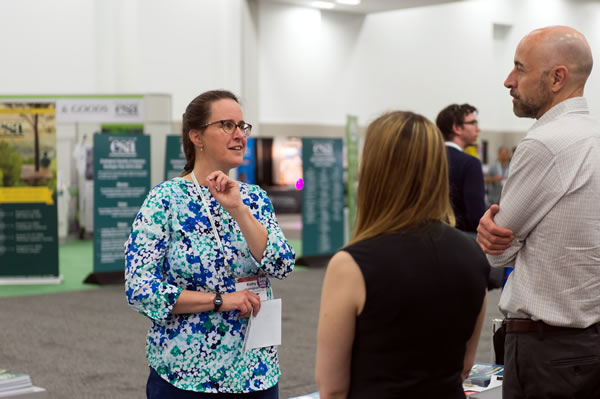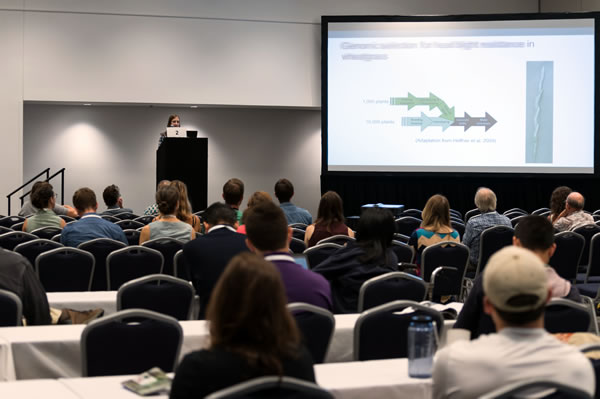
Watch this webinar with 2020 Program Chair Kiona Ogle!
From the ESA Meetings Committee
In March of this year, the Meetings Committee met to discuss how to make ESA Annual meetings more productive, enjoyable, and inclusive for attendees. To inform our discussion, we referenced attendee survey responses from two recent annual meetings.
Attendees frequently mention opportunities to network and develop professional skills as key strengths of the meeting. Student-centered activities are particularly mentioned as a positive aspect of the program. The Inspire session format, which features 5 minute talks in a 90 minute session, is very popular. Attendees appreciate the broad variety of topics represented in the program and generally feel that ESA meetings offer a sense of community.
Attendees frequently mention feeling overwhelmed and mentally exhausted by the current program structure. The scheduling is tight, with short (10 minute) breaks, which make it difficult to accomplish networking without missing sessions. These times for networking are particularly vital for discussion between students, early career scientists, and established career ecologists. There are many concurrent sessions on a broad variety of topics, which leads to conflicts between similar topics. Friday morning scheduling is generally a source of frustration. For session organizers, it is challenging to propose and maintain a session of 6 (symposia) or 10 (organized oral) speakers.
To build on the meeting’s strengths and address its weakness, the following changes will go into effect for the 2020 meeting in Salt Lake City.
For the 2020 Annual Meeting, ESA will pilot the recording of oral presentations. Talks presented within symposia (SYMP), organized oral sessions (OOS), Inspire sessions (INS) and contributed oral sessions (COS) will be included in the pilot. Presentations made as a part of a workshop, short course, special session, or field trip will not be recorded. The audio for each recorded talk will be captured along with the slide content, including slide transitions. Only presenters who wish to participate will be recorded. Any presenter will be able to opt out of being recorded. Recorded talks will be available in the online program (web app) a few weeks after the conference.
We will record all of the plenaries that take place at the meeting again this year. The Opening Plenary, Scientific Plenary and Awards Ceremony, New Phytologist Trust Keynote Speaker, and Recent Advance Lecture will be recorded as video.
To make navigating the program more manageable for attendees and session organizers, oral sessions will be restructured to run for shorter periods of time with longer breaks. For the sessions, each will have fewer speakers to help make session organization more manageable and encourage more people to consider proposing a session. To build these shorter, more compact sessions, talks will be also be shorter.
To help attendees use more of their time for networking, breaks will occur between sessions rather than within them, and all oral session types will break at the same time. The longer breaks will facilitate discussion outside of the talks and allow freer networking and exchange of ideas, benefiting students and early-career scientists. We hope that increasing break time will also help attendees find time to visit the exhibit hall between sessions to see posters, exhibitors, and Career Central.
To address presenters’ frustrations with Friday morning scheduling and to reduce meeting fatigue among attendees, no scientific presentations will be scheduled for Friday. Workshops and field trips will be offered on Friday morning to increase attendees’ opportunities for professional development and hands-on experiences, including sessions for students.
 Shorter sessions and talks will not be enough to reduce conflicts between similar topics in concurrent sessions. Contributed presenters express a strong preference for giving a talk, and for contributed sessions ESA has generally accepted or rejected contributed abstracts individually, in the format the presenter chose, then built sessions out of them after acceptance. This approach allows all contributed presenters to have their preferred format, but it also leads to many contributed oral sessions with overlapping topics.
Shorter sessions and talks will not be enough to reduce conflicts between similar topics in concurrent sessions. Contributed presenters express a strong preference for giving a talk, and for contributed sessions ESA has generally accepted or rejected contributed abstracts individually, in the format the presenter chose, then built sessions out of them after acceptance. This approach allows all contributed presenters to have their preferred format, but it also leads to many contributed oral sessions with overlapping topics.
In order to encourage more poster submissions, a new abstract fee will apply to all oral presentations. By instituting an abstract fee for talks only, and allowing poster submissions to remain free, we hope to incentivize everyone (including senior researchers) to give posters when possible.
Posters are a valuable part of the meeting – they allow for a freer dialogue, in-depth discussion, and even networking. Emerging and Senior scientists can spend more time answering questions than just the few minutes they would otherwise have when giving an oral talk. We want more people to participate in these types of sessions which gives an incredible opportunity for one-on-one and small group discussions and networking.
Abstract fees will allow the society to explore new technological tools and address growing interest in remote participation, e-posters, and on-demand access to meeting content while maintaining a budget that continues to support core administration costs associated with abstract submission, notification, peer review, and scheduling. We are trying to make the meeting more accessible for those that aren’t able to attend the meeting in person by increasing the diversity of those that can access content.
In addition, an abstract fee may help reduce withdrawn papers that create gaps in the program.
 Inspire Sessions have been a popular format since they were first introduced in 2013. These sessions started as an experiment with a new and engaging format, and they have become a core part of the meeting program. To recognize them as an integral part of the meeting program, the timeline for developing Inspire sessions will shift to match symposia and organized oral sessions so that all 3 invited oral session types can undergo a parallel peer review process.
Inspire Sessions have been a popular format since they were first introduced in 2013. These sessions started as an experiment with a new and engaging format, and they have become a core part of the meeting program. To recognize them as an integral part of the meeting program, the timeline for developing Inspire sessions will shift to match symposia and organized oral sessions so that all 3 invited oral session types can undergo a parallel peer review process.
The committee discussed how to become more transparent and communicate more effectively with meeting attendees. One first step in this direction is this message to our attendees and members. Another is to host an information session during this year’s meeting to explain the committee’s ongoing work and to invite questions and suggestions. If you are unable to attend the information session in Louisville, we encourage you to complete this year’s annual meeting survey which will be emailed to all attendees near the end of the meeting.